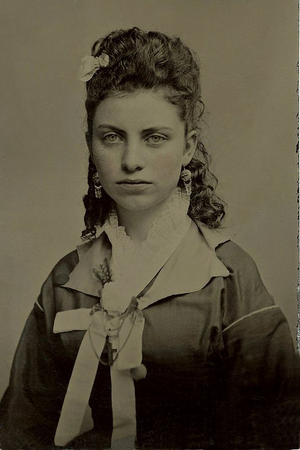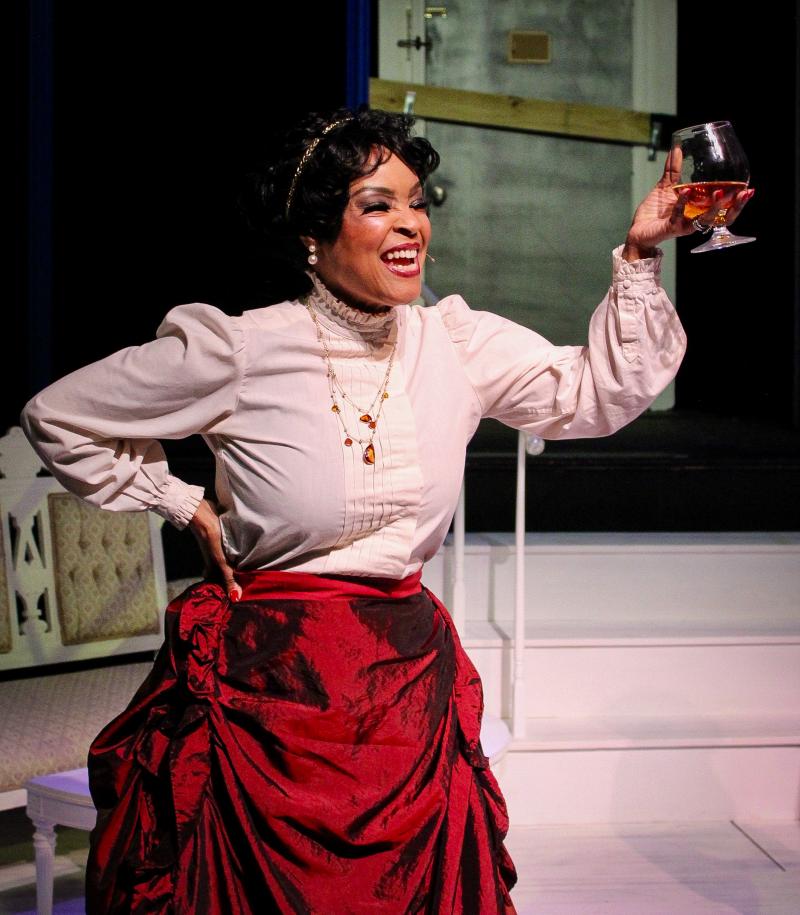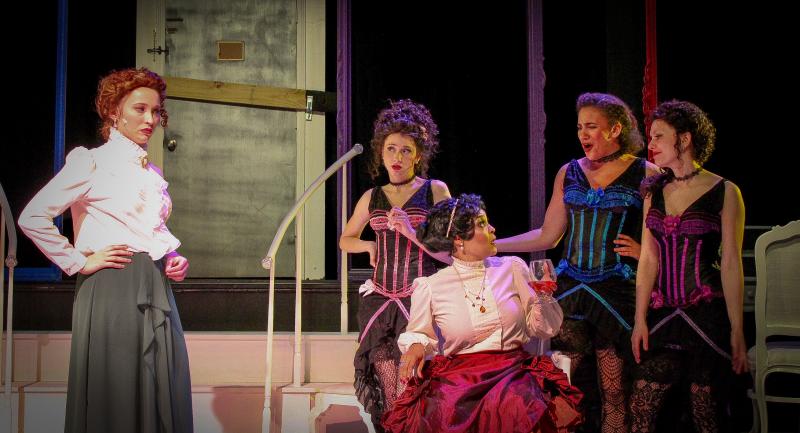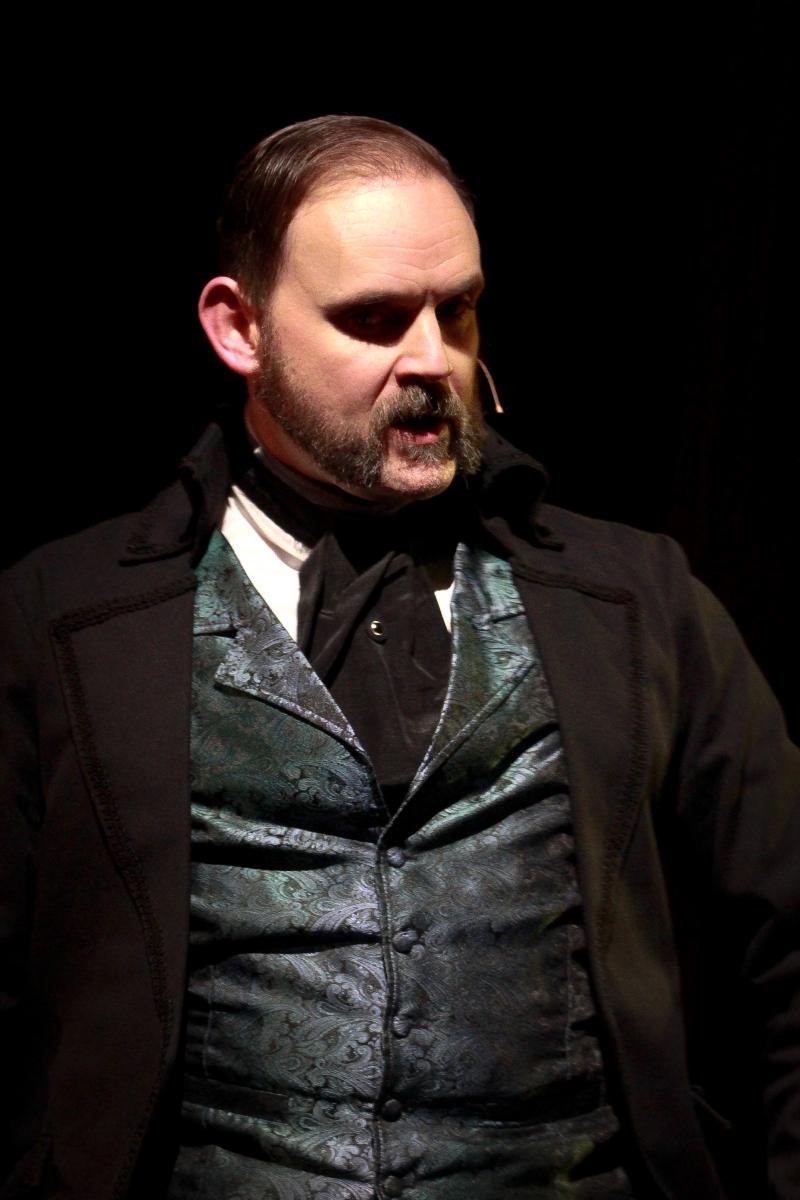Review: MADAM at .ZACK
We in St. Louis have seen our fair share of theatrical world premieres. But I can't recall a single one that has (like most Broadway shows) had an out-of-town tryout run.
The spanking new Fly North Theatricals company did just that with their new show Madam. After dipping her toe into St. Louis with the performance of a scene at last year's Grand Center Theatre Crawl, Madam ran for seven performances in Hannibal in August. And now she has officially opened at the .ZACK.
I was excited by that amuse-bouche at the Crawl and I was delighted, now, to see Madam in all her glory. The story is a rich nugget of St. Louis history.
I n 1840 young Eliza Haycraft, "having fallen prey to the arts of a seducer, became an outcast from home and society". She traveled down the Missouri River-"all alone on a frail canoe on the turbulent bosom of the Missouri"-and made her way to St. Louis. She was penniless, illiterate, intelligent and good-looking.
n 1840 young Eliza Haycraft, "having fallen prey to the arts of a seducer, became an outcast from home and society". She traveled down the Missouri River-"all alone on a frail canoe on the turbulent bosom of the Missouri"-and made her way to St. Louis. She was penniless, illiterate, intelligent and good-looking.
And she prospered.
By 1870 she had risen from prostitute to Madam. She owned five brothels and was the richest woman in St. Louis. She was famous for her philanthropy, giving generously, especially to widows and orphans of the Civil War. When she died (at fifty-one) thousands attended her funeral procession.
This new musical focuses on Eliza's efforts to attain a final resting place at Bellefontaine cemetary. But it equally concerns the hopes and struggles of some of the young ladies who were her employees.
Madam, with music, lyrics, book and orchestration by Colin Healy, is a lovely and most economical musical. Beyond Madam Eliza the cast consists of only four of her "girls" ( Billie, Tennie, Ripley and Calista), a mysterious newcomer (Mercy), and a gentleman client (billed as "The Benefactor").
Now the Benefactor is keen on acquiring the building where Madam Eliza houses her business so he can build a tower and get rich, but Eliza is keen on keeping it and on protecting her girls. Besides, Eliza simply hates men. A knock on the door introduces the lovely young "Mercy" seeking, as it were, shelter from the storm. She's obviously not a street-girl looking for employment but Madam welcomes her nevertheless. And Mercy is eager to do anything to earn her shelter. (Well, not "THAT"!)
It's  a marvellously strong cast. Kimmie Kidd-Booker triumphs as Madam Eliza. With a terrific voice and literally flashing dramatic eyes she makes Eliza a powerhouse of determination.
a marvellously strong cast. Kimmie Kidd-Booker triumphs as Madam Eliza. With a terrific voice and literally flashing dramatic eyes she makes Eliza a powerhouse of determination.
Abigail Becker, as Mercy, gives us some of the loveliest musical moments; her voice is a dream to hear.
Marta Bady brings a fine voice and lovely, confident physical grace to the role of Billie. Her skin is a shade or two darker than that of her colleagues; she might appear on the menu of the house as (in the condescending terminology of that era) an exotic "octaroon". Billie bravely fought herself out of slavery-then, disguised as a man, she fought in the Union army.
Eileen Engel plays Tennie (Tennessee). She has a sister (Victoria Woodhull) who was the first woman to run for presiden t (though she was actually too young for the office). Tennie dreams of Victoria coming to rescue her. Miss Engel is blessed with a most stage-worthy face-dramatic eyes and a smile with teeth to die for. She nails the role. (History tells us that Tennie and Victoria went on to careers as newspaper publishers and feminist radicals.)
t (though she was actually too young for the office). Tennie dreams of Victoria coming to rescue her. Miss Engel is blessed with a most stage-worthy face-dramatic eyes and a smile with teeth to die for. She nails the role. (History tells us that Tennie and Victoria went on to careers as newspaper publishers and feminist radicals.)
The delightful Gracie Sartin brings her bright charm to the role of Ripley, the girl whose heart is bound to her friends in the brothel. Ripley is the one who cares about people.
Calista is the girl who will famously say "yes" to anything a client requests. Cameron Pille plays this role with deep commitment. She gives a visceral strength to this woman who is dying from the "occupational hazards" of her profession. It is she who strikingly asserts and relishes one of the central tenets of this story: the right of a woman to say "no".
 Phil Leveling is "The Benefactor". He looks every inch the ruthless would-be empire builder of that era, and conveys a brutal determination that matches that of Madam Eliza.
Phil Leveling is "The Benefactor". He looks every inch the ruthless would-be empire builder of that era, and conveys a brutal determination that matches that of Madam Eliza.
In 1870 St. Louis was considering the Social Evil Ordinance. This would legalize and regulate houses of prostitution. Now Eliza had three unbreakable house rules:
- Respect (for the girls)
- Pay up front
- Consent (The girls can say "no".)
The new ordinance, if passed, would require the girls to take on any customer. But if Eliza sells the house to the Benefactor he can, he says, make all that go away. And he'll get her that plot at Bellefontaine.
Colin Nealy's music is splendid-rich and varied, with a good Broadway sound interleaved with softer more intimate passages. His lyrics are fresh and intelligent with clever rhymes (or near-rhymes). They're not unlike Stephen Sondheim's.
But I had problems with the book. There are plot elements that are not quite clear.
Now the acoustics at the .ZACK are a little unkind; the band (especially percussion) was a bit too loud; the singers were a bit over-amplified, which really does not help our understanding of lyrics. There is very little spoken dialogue in the show, so the lyrics are our only way to reach the plot-and I had trouble hearing some of them. There are a couple of flash-backs and flash-forwards (and overlapping of "now" and "then") which is a bit confusing.
Fly North was kind enough to let me read the libretto and it is smart, it is emotive, it is touched with poetry. But it is often fragmentary and sometimes incoherent. I wonder if some valuable expository dialogue might have been left on the cutting room floor to squeeze the show in under two and a half hours.
In any event Madam is an excellent and exciting show. It tells a local story that is well worth watching. It countinues at the .ZACK through February 2nd.
(Photos by Caroline Guffey)
Reader Reviews

Videos

